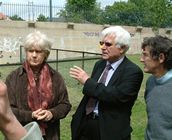Wolseley Gardens campaign for barriers vindicated
| Related Links | |
Ann Keen and Dave Wetzel visit Wolseley Gardens Residents urged to stay quiet over traffic noise for fear of affecting house prices It's Official - A4 is one Britain's noisiest roads Mayor publishes findings of ambient noise Draft Study Support Grows for campaign against A4 noise Grove Park looks to tackle A4 noise problem |
|
| Participate | |
Sign up for our free weekly newsletter |
The protracted campaign by residents of Wolseley Gardens to get noise reduction measures in place is continuing to make progress.
More evidence to support their campaign was forthcoming when an official survey showed that noise intensity in the area was at twice the level that the Highways Authority consider to be the threshold for the installation of noise barriers. The Highways Authority are contemplating spending £3.5 million to improve the existing barriers along the elevated section of the M4, but east of that section (i.e. the Wolseley Gardens stretch) is Transport for London's responsibility. TfL do not have a budget for environmental works of this nature.
The projected noise levels for this location are 'off the top of the scale' according to the noise survey and much higher than for the stretch that the Highways Authority intend to improve. In addition, the higher level of the road there means most of the noise passes clear over nearby buildings, much of the property affected is commercial not residential, and the residential density is much lower.
A campaign spokesperson said, "For that stretch, which already has a barrier, to be further improved and Wolseley Gardens left with no barrier at all is an obvious nonsense - and TfL implicitly recognise that fact. They say they are approaching the Highways Authority to extend their barrier onto TfL's part of the road, presumably on the basis that it is the Highway Auuthority's 'customers' who are creating the noise pollution here. I don't know what their chances are."
Having waited two years for the results of the survey the group have now had to wait a further month for a meeting with TfL to have the implications explained to them. TfL recently cancelled a meeting to discuss the subject. They remain determined to press on despite official indifference and complaints from one local politician that their campaign was affecting house prices in the area.
The group's spokesperson said, "Clearly this is one of the worst affected locations for traffic noise in the country. It is nonsense for us to be kept waiting whilst major barriers are going up all over Europe (including the supposedly impoverished Eastern Europen states), in locations where the problem is much less and the number of people affected is much lower. Even the other parts of the UK are now belatedly getting barriers, but not here where the problem is demonstrably off the top of the scale."
They have been advised that the concerns they are raising are a human rights issue and say that if TfL's inaction continues, their next step will be to try to raise a fund for legal fees.
January 27, 2005
